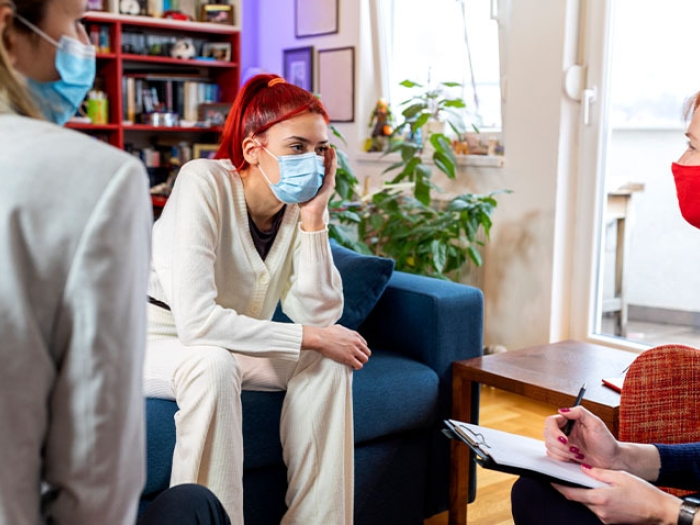Study: 1 in 7 children and teens have at least one treatable mental health disorder; treatment and prevalence rates vary considerably by state.
8:16 AM
Author |

Nearly 7.7 million children and teens in the country – about one in seven – have at least one treatable mental health disorder, including depression, anxiety or ADHD, new research finds.
But half of these young people did not receive needed treatment from a mental health professional in 2016, according to the University of Michigan study published in JAMA Pediatrics.
"Untreated mental health disorders can have a debilitating impact on children's healthful growth and throughout their transition to adulthood," says lead author Daniel Whitney, Ph.D., a post-doctoral fellow with Michigan Medicine's Department of Physical Medicine and Rehabilitation.
"Our findings suggest alarming gaps in treatment for treatable mental health conditions among children. This could lead to increased, preventable risk for these and other health conditions becoming worse later in life."
Researchers analyzed data from the 2016 National Survey of Children's Health, which surveyed parents of children ages 17 and under. Of the 46.6 million children included in the study, 16.5 percent had at least one mental health disorder.
"Hopefully, these findings encourage parents, clinicians and communities to be more open about talking about mental health disorders and seeking treatment for these conditions, especially for children and adolescents," Whitney says.
LISTEN UP: Add the new Michigan Medicine News Break to your Alexa-enabled device, or subscribe to our daily audio updates on iTunes, Google Play and Stitcher.
Treatment gaps vary
The prevalence of mental health conditions among youth and the gap in treatment varied widely by state. Washington, D.C., for example, had the lowest prevalence of children left untreated (nearly 30 percent) while North Carolina had the highest percentage, with more than two thirds of children not receiving needed treatment or counseling (72 percent.)
Alabama, Mississippi, Oklahoma and Utah were also in the top quartile for the prevalence of children with a mental health disorder who did not receive needed treatment.
Meanwhile, the prevalence of mental disorders among kids ranged from 7.6 percent in Hawaii to 27.2 percent in Maine.
While further research is needed to explore reasons for geographical disparities, possible factors may include policy differences, socioeconomic factors, access-to-care issues or even parents' individual decisions, says senior author Mark Peterson, Ph.D., M.S., U-M associate professor of physical medicine and rehabilitation and current policy fellow at the Center for Healthcare Research and Transformation.
"We need to better understand the stark geographical differences in health services provided to children with mental health conditions so we can improve care for this population," Peterson says. "Reducing the burden and improving treatment across states may require policy changes."
MORE FROM MICHIGAN: Sign up for our weekly newsletter
Peterson noted that the study is part of ongoing research by the Michigan Medicine physical medicine and rehabilitation team looking at comorbid physical and psychological outcomes, health services and disparities among children, adolescents and adults, particularly those with physical disabilities.
Parents in the survey were asked whether their child had ever been diagnosed with a mental health disorder and if they had received treatment or counseling from a psychiatrist, psychologist, psychiatric nurse or clinical social worker.
Pediatric mental health experts say the findings are in line with previous research and that numbers may even be underestimated, since some children with mental health conditions may not yet be diagnosed.
Hopefully, these findings encourage parents, clinicians and communities to be more open about talking about mental health disorders and seeking treatment for these conditions, especially for children and adolescents.- Daniel Whitney, Ph.D.
Addressing barriers
Too few providers, increased downward financial pressure on the mental health system and a growing number of children needing treatment creates the "perfect storm," says Sheila Marcus, M.D., pediatric psychiatrist at U-M's C.S. Mott Children's Hospital.
"The number of mental health providers relative to the number of children who need this care is woefully inadequate," says Marcus who also leads the Michigan Child Collaborative Care Program (MC3) that provides primary care providers with critical psychiatric support services.
"This severe shortage is the single greatest barrier to receiving resources."
In Michigan, for example, half of counties don't have any child psychiatrists, Marcus notes, which creates geographic disparities even within the state. Meanwhile, mental health professionals are seeing an increasing number of children who experience trauma from growing up in poverty, exposure to an adult with a substance abuse disorder and other scenarios that exacerbate rates of mental health issues in childhood.
The U-M Depression Center and Mott started MC3 in collaboration with the Michigan Department of Health and Human Services in 2012 as a response to the gap. Among several services, the program provides same-day phone consultation and telehealth consultations between child psychiatrists and primary providers. MC3 is now in 60 counties in Michigan with more than 2,600 enrolled providers.
"Most counties in Michigan as well as in other rural areas in the U.S. don't have access to a child psychiatrist or others trained in brain-behavior illnesses," Marcus says. "Our goal is to best leverage psychiatry resources on behalf of Michigan's most vulnerable children."
Marcus says a combination of strategies is needed to address treatment gaps, including policy changes in insurance reimbursement rates to public and private mental health facilities, recruitment efforts to draw more specialists into the field and strong partnerships between child psychiatrists and primary care providers.
Adopting more trauma-informed approaches to care is also key to preventing misdiagnoses and making sure children are receiving appropriate treatment.
"Children's emotional wellbeing is just as important as their physical health," Marcus says. "It's critical that we continue ongoing efforts to ensure children and teens who are struggling with emotional, behavioral, and developmental problems and disorders are getting the resources they need."

Explore a variety of healthcare news & stories by visiting the Health Lab home page for more articles.

Department of Communication at Michigan Medicine
Want top health & research news weekly? Sign up for Health Lab’s newsletters today!





